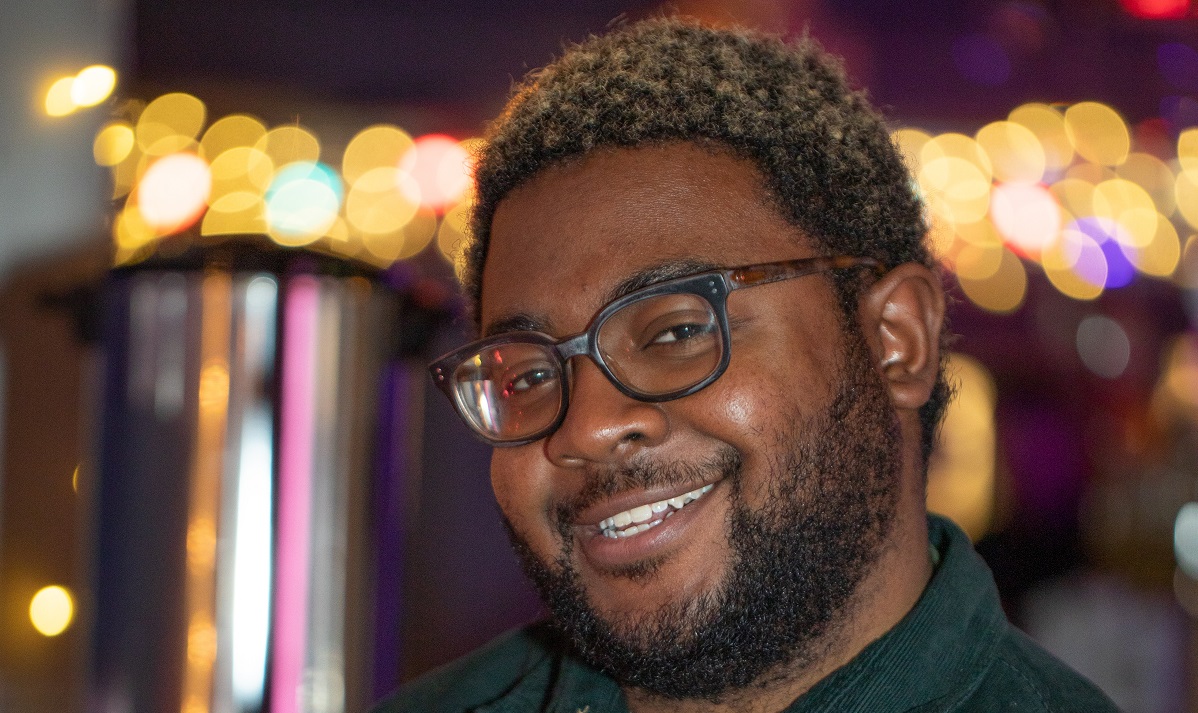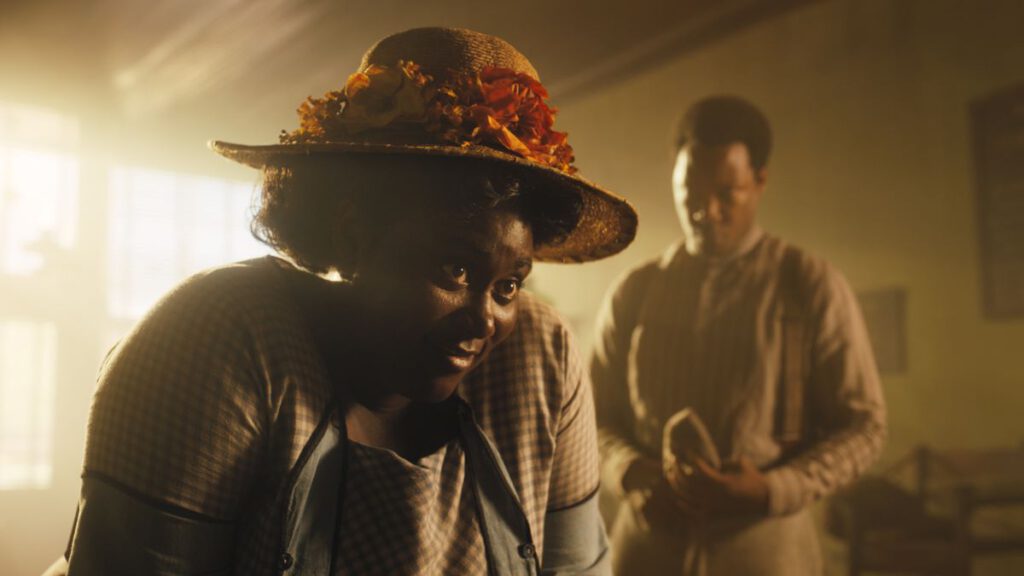The moment Danielle Brooks’ Sofia makes her grand entrance in Blitz Bazawule’s “The Color Purple,” talking trash to Colman Domingo’s intimidating Mister in a men-exclusive bar, she brings a lofty self-assurance to the film right when it needs it most. The outspoken, confident Sofia isn’t only the antithesis of Celie’s character, but she is also her companion, the baton who guides the depiction of Black female strength across its narrative. Brooks knows the character like the back of her hand, having portrayed her on Broadway in the 2015 stage revival of the musical. She was given the freedom to enrich the character even further in this screen adaptation.
In the wake of the film’s massively successful Christmas Day release, RogerEbert.com hopped on a call with Brooks and discussed Sofia’s leap from stage to screen, the encouragement Brooks received from Oprah Winfrey, and Brooks’ journey to ensuring the timeliness of this early 20th century character.
Since some time has passed between portraying Sofia on stage and in this picture, was there any hesitancy in reprising the character?
Like my character says, “Hell no!” This is the gift of all gifts right here. To be a part of “The Color Purple” in a cinematic way is something that’ll live forever. That’s something that I’m glad I get to be a part of, get to hold onto, to get to share with my family and the world. So there was no hesitation in taking this role.
Is there anything you needed to do in order to get back into Sofia’s shoes?
I’ve been living with Sofia for over a year because I had played her on Broadway in 2015. So I knew her pretty well. I think it’s really adjusting to the new approach to the story. So having a new director, who has a very specific vision, and also adjusting to a new cast. They’re going to come in with their ideas and their approach to the characters. But for me, that’s fun. The stuff I love is getting to explore and see where things go. The most challenging part was saying the most iconic lines in front of Miss Oprah Winfrey. That was the thing I tried to stay level-headed about because, you know, you want to make her proud, or, I wanted to make her proud. I do remember at the end of shooting the “You told Harpo to beat me” scene, we found each other, and we were both in tears. She said to me, “You did it. You found her.” That was just such a beautiful moment to share with her.
Was there any way you and Blitz updated Sofia’s persona to flesh her out further here than on stage?
I think so. It really boils down to the time Blitz took to find his characters, or, his actors to play these characters. Because my audition process took six months, he was able to put in stone that he had found his Sofia. Because of that, I was given freedom when we were shooting because he trusted the choices that I was going to make. I just got to live in all of who she was, because as exciting and as imaginative as theater can be, it also can be very limiting. Because once you lock a show, which means, once you open a show, you can’t make changes to that show.
After a year of playing her, there were so many things I wish I could’ve explored and wasn’t able to because you have to keep the show the same. And so now, in the film version, all of these ideas that I have, I got to go to Blitz and say, “Hey man, I got this other idea. Can I try this?” He was open to that. That’s where I was able to find so many beautiful moments.

What was one of the most significant choices you made that ended up being in the final cut that you’re like, “I’m glad I got to do that”?
A lot of people have been gravitating towards Sofia busting down the door with her foot, when I raised my foot in the air coming into “Hell No!” That’s definitely one of those moments where a director’s like, “All right, we want you to come through the door.” And I went to Blitz and I was like, “I don’t think she just came through the door any type of way. I feel like she’d bust the door open with her foot.” He loved it. He was like, “Yes!” And he found a way to get the crew to rig the door for me to bust the door open over and over again. That’s something that stuck and that was a beautiful, cool, very Sofia-esque moment.
Speaking of that number, I love how effortlessly you deliver this choreography. What was it like working with choreographer Fatima Robinson over the course of the production?
I love working with Fatima. I wish I could call myself a triple threat, but the reality is dancing is not my strong suit. Luckily I have rhythm, but remembering a whole bunch of eight counts isn’t really my calling in life.
I’m really grateful to Fatima for her patience in finding the choreography with me. That’s what’s so cool about her is that she really likes to lean into what the actor’s capabilities are instead of trying to force you into a box of one-two steps. She tries to help you find your own one-two steps. I appreciate that. So yeah, getting to work on “Hell No!” with her was very successful and just so empowering. To see all of these Amazonian women together and telling such a powerful female empowerment song and sharing that with the world was a highlight.
With Sofia being a generational, fully independent woman of a century ago, how did you craft her eternal spirit to make her transformative for today?
Sofia truly is a radical woman. She’s a woman that is kind of a step ahead of her time with how she moves. I think about how, at the time, people were killing Black babies. She decided I’m gonna have six of them. They were telling her to come be a maid. And she’s like, “hell no. I’m gonna do my own thing.” So I just really love that she walked and moved how she wanted to walk and move. Especially coming off of the MeToo movement. It’s just another moment for us to remember to do life how you want to do life. You know what I mean? It’s okay to put your foot down on things that have been normalized, things that should take a back seat these days. I have a 4-year-old daughter and I think it’s pretty cool that she’ll get to grow up in a world where her mother, on-screen and off-screen, preaches “hell no” to whatever it is that she as a young girl or a young adult needs to say “hell no” to. That’s pretty cool and empowering.
I wanted to share this aspect both times I saw the film with my mom. I took her to see it with me at the DGA screening. I looked over to my mom and she’s just tearing up and I was like “Damn, I have not seen my mom cry during a movie in a very long time. Oh my God.”
That’s the power of what we do. You know, that’s what good films should be giving us: the permission to open parts of our heart that we haven’t done in a long time. It’s exciting to hear stories like that because that truly is the magic of “The Color Purple” and being a part of two renditions. I’ve seen it on Broadway where people are holding hands, who were once strangers, crying with each other during the final number.

How did you carry the weighty responsibility of being the instrumental force of the story? Because, personally, both times I thought, “I don’t know if I’m okay unless Sofia’s okay?”
I was really trying to focus on people seeing themselves. You know what I mean? Holding that mirror up to times where we felt pain and hurt because that’s what life is going to throw at you, regardless. That’s the only way to make it through life. You’re going go through some mountains and some valleys and some trials and tribulations. I’ve been through them myself; I’ve watched women in my life go through them and I’ve watched women in history that I admire try to make it through [them]. That’s what I try to give over to, to allow myself to be a vessel to speak for so many people, not just women, but people. If Sofia can go through this and get back up, then I can get through it too.
That’s different from Celie. Like, I think she, of course, has a beautiful story: you are watching somebody come into their power. Sofia’s always had the power and the world took it away. So how do you find it, then? It’s been quite the journey for me stepping into this role too because every character gives you a gift. Out of all the characters I’ve played, she’s definitely given me the biggest gift in so many ways, but particularly to own my power. To sit in it and marinate it and live in it fully without apology, knowing when life does get hard, when this industry does want to make me feel like I can’t keep going, I too can have a renewal and a rebirth and come back into my power. That’s the biggest gift I’ve been given playing her.
I just wanted to know that laugh. Like how many takes did it take to represent that portrayal of catharsis and where did it take root from?
Well, I have to tell you, I’ve crafted that laugh for years now, playing it on Broadway eight shows a week. That’s where I found that laugh. When you have a live audience, they tell you immediately what works and what doesn’t. So I got to craft something that will last for years. That’s something I definitely wanted to keep. You know, that’s also sort of where I found the cry into the laughter for the dinner scene. It was in the theater. I knew I wanted to keep that as well in this moment, because I think a lot of us try to hold on, right? We really try to mask our pain through laughter.
I know I’ve been privy to doing that a lot in my lifetime. But sometimes all you really need to do is cry, especially women of color. Black women, even Black men, don’t allow themselves to cry, to let it out. There comes a point where you can’t hold that laughter anymore. You can’t mask that pain anymore. That’s what that moment was for Sofia. She laughed. Because it’s funny, but also because there was a well in there that she really was ready to get out. And she had to do it, at that moment.
“The Color Purple” is now playing in theaters.












